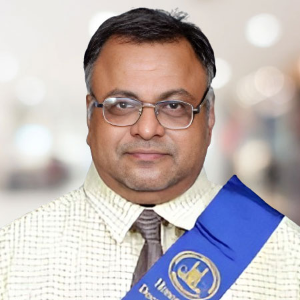Title : Importance of plant science and molecular biology for the sustainable seed-cotton (or kapas) development
Abstract:
Organic seed-cotton (or kapas) is the seed-cotton (or kapas) grown without using synthetic chemicals either as pesticides or as growth promotors, there by supporting plant science, molecular biology, bio-diversity and bio-geo- chemical cycles. Genetically modified seed-cotton is not sustainable seed-cotton. This kind of seed-cotton is cultivated using lower levels of pesticides and fertilizers; however, it is not completely free from them. Organic cotton does not use genetic modification, chemical pesticides or fertilizers. Helicoverpa armigera, commonly known as American cotton bollworm, is a pest that causes boll worm diseases which is a serious damage to seed-cotton (or kapas) crops. Extensive use of chemical insecticides, such as pyrethroid and organophosphates, has led to the development of resistance against these chemicals in H. armigera. Pectinophoro gossypiella, is commonly known as Pink Bollworms and bud worm. India has adopted Bt seed-cotton (Bt Kapas) in the year 2001, which is grown in almost 90% of its total cotton area. Bt Cotton is the seed-cotton (or Kapas) that is seed-cotton crop which a kind of plant duly modified genetical seed-cotton. The toxicity produced by the bacterium Bacillus thuringiensis (Bt) that is the gene production pesticide added in to the genome of the cotton. Bt Toxin which acts as a pesticide or insecticide for the insects destroying the seed-cotton crops. The insect resistant genetically modified seed- cotton was designed and developed from the soil bacterium Bacillus thuringiensis in such away enables to produces Bt Protein and kills Heliothis (cotton bollworm) responsible for eating the seed-cotton leaves. Bt Gene protects the cotton plants from bollworm and bud worms which are major pest of seed-cotton as the bollworms present on the leaves become lethargic and sleepy and thus cause less damage to the seed-cotton plants. Bacterium Bacillus thuringiensis (Bt) is a bacterium that is not toxic to humans or other mammals but is toxic to certain insects when ingested as it is important consideration for the growth of the seed-cotton (or kapas) plant science and molecular biology. Bt works as an insecticide by producing crystal shaped toxic protein that specifically kills certain insects and protects transgenic seed-cotton crops. As the Bt Toxin gene is cloned from bacteria as it provides insects’ resistance, the need for decreasing traditional insecticides which results in less soil pollution from these non-biodegradable chemicals. This causes swelling and lysis for the bud and bollworm insects ‘s death. The Bt.cotton growth rate and sustainability of pesticide reductions have been considered in this research paper. The genetically modified seed-cotton in India, have considerably reduced chemical insecticides usage by 38% while increasing seed-cotton productivity by 22% and increasing farmer profitability by 70%. The usage of pesticide has considerably reduced by using Bt Technology for sustainable cotton development. The regular seed-cotton is in the textile manufacturing process. Regular seed-cotton come from the genetically modified seed-cotton. The genetically modified seed-cotton provides resistant to three kinds boll worms such as American seed-cotton bollworms and pink boll worms, UK bollworms. Helicoverpa armigera, commonly known as American cotton bollworm, is a pest that causes serious damage to cotton crops. Extensive use of chemical insecticides, such as pyrethroid and organophosphates, has led to the development of resistance against these chemicals in H. armigera. The emerging pest of seed-cotton (or kapas) is called Helopeltis bradyi (water house) as major pest in interspecific Bt seed-cotton which has the history of causing cent percent damage and yield loss to seed- cotton due to boll worm diseases. The Helicoverpa gelotopoeon as also major pest that causes reducing productivity. Regular seed-cotton comes from Genetically modified seed-cotton (GMS). GMS that modifies in order to resist bugs and more pesticides are required when bugs become stronger and more resilient., The seed-cotton bollworm can cause quality, productivity and yield sustainability losses of 67% due to boll worm diseases caused by American boll worms, UK bollworms, pink boll worms resulting damages to crops and lint cotton. Therefore, effective and efficient product and process management must be required for sustainable seed-cotton development. It is further concluded that natural seeds are to be designed and developed to produce organic seed-cotton and organic colour seed-cotton as it is considered important for the sustainable plant science and molecular biology. Pesticides, insecticides, genetically modified seed-cotton and other harmful chemicals are not to be used in cultivating seed-cotton (or kapas). Organic seed-cotton is generally less environmentally destructive than conventional seed-cotton as organic seed-cotton does not use any pesticides, insecticides, bollworm and bud worm resistant seed-cotton, transgenic seed-cotton. Conventional seed-cotton are manufactured for meeting industrial requirements and conventional seed-cotton growing methods, and environmentally unsustainable methods. Sustainable seed-cotton is inclusive of organically produced seed-cotton due to the beneficial requirements in organic cultivation practices. It is concluded that the sustainable seed-cotton production using sustainable organic practices including organic seed-cotton and naturally pigmented colour seed-cotton must be on the rise as it is important consideration of seed-cotton(or kapas) plant science and molecular biology for the sustainable seed-cotton (or kapas) development.
Key words: artificial, kapas, lint-cotton, natural, productivity, quality, seed-cotton, sustainability.
Audience Take Away:
- The conceptual approach of the product and process and combined growth management of seed-cotton (or kapas) sustainable technology
- Sustainable seed-cotton technological development
- The research work provides practical solution to the present seed-cotton technological problem.
- The paper will improve the reliability, timeliness and accuracy of seed-cotton design, or provide new information to assist in a seed-cotton design and development problem.



